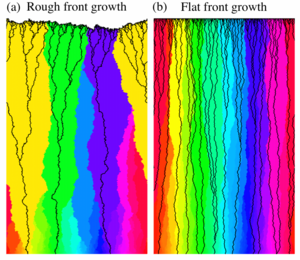In a spatially expanding biological population, subpopulations compete for space along the propagating population front. Often this front is not smooth, but instead increasingly rough with time. For non-motile organisms, the ancestral lineage trees trace out superdiffusive random walks during the expansion, due to the front roughness. The statistical features of these “KPZ random walkers” have important implications for the population’s evolution, including the decay of genetic diversity. This work with Sherry Chu, Mehran Kardar, and David Nelson uses numerical techniques to calculate scaling laws for lineage coalescence statistics, and shows how these laws are modified by environmental heterogeneities.
Link to article Preprint: arXiv:1812.09279


